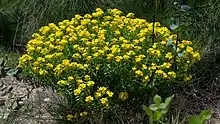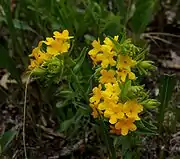Lithospermum caroliniense
Lithospermum caroliniense, commonly known as the hairy puccoon or Carolina puccoon or Plains puccoon,[2] is a flowering plant found in the Midwestern United States and Canadian provinces surrounding the Great Lakes.[3] The plant grows in sandhills, pine barrens, and dry, sandy woods.[4]
| Lithospermum caroliniense | |
|---|---|
 | |
| In Nevada County, Arkansas | |
| Scientific classification | |
| Kingdom: | Plantae |
| Clade: | Tracheophytes |
| Clade: | Angiosperms |
| Clade: | Eudicots |
| Clade: | Asterids |
| Order: | Boraginales |
| Family: | Boraginaceae |
| Genus: | Lithospermum |
| Species: | L. caroliniense |
| Binomial name | |
| Lithospermum caroliniense | |
Description
Dr. Robert W. Poole and Dr. Patricia Gentili describe the hairy puccoon as follows:[5]
Flowers large (up to 1 inch in diameter) yellow-orange with 5 petals and basal parts of petals fused into a long corolla tube. Stamens hidden in corolla tube. Flowers arranged in a flat-topped cluster or weakly curled, short sprays. Stem and leaves coarsely hairy. Leaves broadest in the middle, tapering at either end, and outer margin smooth. Plant 1 to 2.5 feet in height.
 Flowers of hairy puccoon at Illinois Beach State Park
Flowers of hairy puccoon at Illinois Beach State Park
Cultivation and uses
To cultivate Lithospermum caroliniense a warm sunny position in a moderately fertile well-drained lime-free sandy soil is needed.
A red dye is obtained from the dried or pulverized roots. The powdered root has also been used in the treatment of chest wounds.[4]
References
- NatureServe (1 September 2023). "Lithospermum caroliniense". NatureServe Network Biodiversity Location Data accessed through NatureServe Explorer. Arlington, Virginia: NatureServe. Retrieved 9 September 2023.
- "PLAINS PUCCOON". Ohio Department of Natural Resources. Retrieved 2021-05-31.
- United States Department of Agriculture
- Plants for a Future
- nearctica Archived 2008-07-26 at the Wayback Machine
External links
 Data related to Lithospermum caroliniense at Wikispecies
Data related to Lithospermum caroliniense at Wikispecies- "Lithospermum caroliniense". Plants for a Future.
